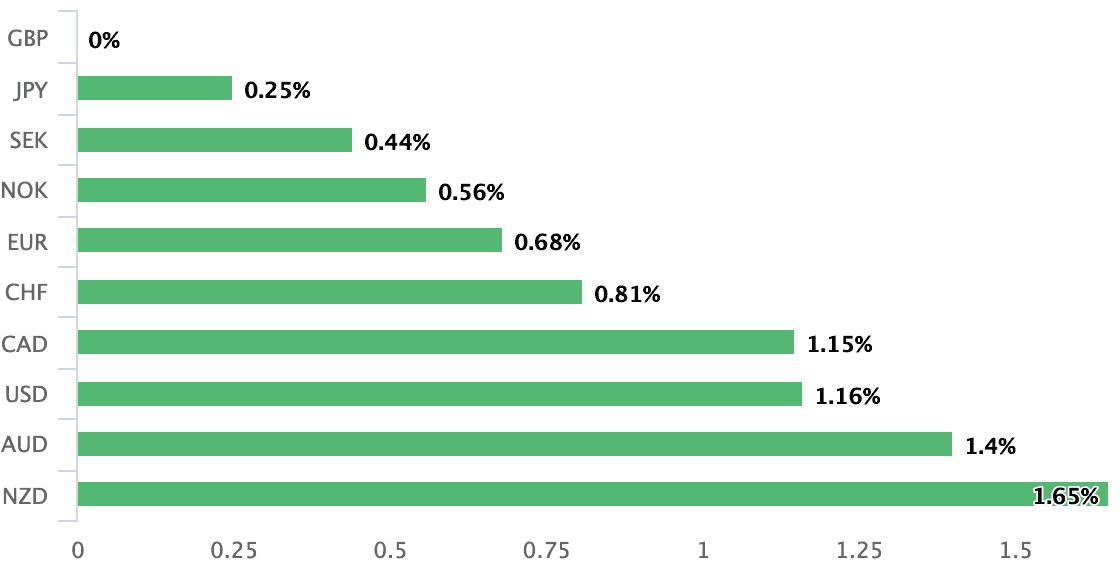Pound Sterling is Week's Best Performer, but Analysts Forecast Downside Ahead

Image © Adobe Images
The British Pound was the best-performing major currency over the course of the past week, recording gains against nine of the world's most liquid currencies.
Gains saw the Pound hit three-week highs against the Euro, U.S. Dollar and other currencies, but analysts are expressing scepticism that the bounce seen following Prime Minister Boris Johnson's trip to France and Germany can be sustained.
Sterling rallied after President Macron of France and Chancellor Angela Merkel of Germany showed they were open to talking about potential changes to the Northern Ireland backstop.
The initial takeaway by markets is that communication lines between the EU and UK are in fact still open, and therefore the prospect of a deal being struck before October 31 cannot be written off. To paraphrase Johnson after his meeting with Macron in the Elysee: where there is a will, there is a way.
The Pound-to-Euro exchange rate rallied by over a percent on the developments to record a three-week high at 1.1075, before paring gains to trade at 1.1029.
The Pound-to-Dollar exchange rate rallied to 1.2252, before paring back to 1.2228.

Above: Sterling recorded gains against all major currencies in the past week
Having digested the developments, foreign exchange analysts are however expressing caution as to the extent the recovery in Sterling can extend.
"Personally I don't see the the recent Sterling optimism regarding the backstop, clearly the market is just reducing shorts & unwinding hedges. Solid longer term interest we estimate will remain on the sell side. I suggest the market reassessing the content of Boris Merkel & Macron backstop comments this week," says Neil Jones, a currency trader at Mizuho Bank in London.
Foreign exchange markets have been betting heavily against the Pound since May when it became clear that the existing Brexit Withdrawal Agreement struck between the EU and Theresa May's government would not be ratified.
The failure triggered her resignation and ultimately the installation of Boris Johnson as Prime Minister who has struck a decidedly more robust tone on Brexit.
Understandably, markets have over recent weeks been raising their expectations for a disruptive 'no deal' Brexit on October 31, and selling the Pound is the clearest and cleanest way of expressing this rising fear.
The market has however become heavily invested in this trade, making it something of a one-way ticket. The crowded nature of the trade means it can suddenly become prone to unwinding as traders exit or book profits.
"A number of shorts appear to have cut back," says Mizuho's Jones, suggesting therefore that recent Sterling strength could be more of a technical phenomenon rather than a newfound vote of confidence in Sterling.
Both Merkel and Macron suggested there were thirty days within which a solid solution to the vexing question of the Irish border could be brought forward and considered.
Johnson has today apparently set his ministers the task of turbo-charging their work on delivering a solution that European leaders might find acceptable and open the door to a negotiated Brexit on October 31.
However, the European Union has laid down thick red lines on the matter, saying the Withdrawal Agreement is firmly shut and the Irish border backstop is not open for discussion. It might simply be that the Europeans have boxed themselves into a corner they cannot manoeuvre out of.
"After almost three years of negotiations, no viable alternative solutions to the Irish backstop has been found. We doubt a solution can materialise in 30 days in time for Parliamentary approval in the EU and U.K. before the end of October. As a result, we expect the GBP to decline as the 31 October deadline approaches," says Kim Mundy, a foreign exchange strategist with CBA, the Sydney-based financial services group.
And with time being in such short supply, foreign exchange strategists are understandably maintaining a cautious approach to Sterling.
We would suggest that those with an eye on the Pound should view any strength as likely to be short-lived in nature and maintain a stance that the balance of risks remain skewed to the downside.
Take advantage of any bounces when they do come around.
Indeed, Jane Foley, a foreign exchange strategist with Rabobank in London says the Pound could fall to parity against the Euro were a 'no deal' Brexit to take place.
"Even though a delay to Brexit would likely trigger some relief in GBP markets, we anticipate that EUR/GBP could be hard pressed to fall below the 0.90 level on this scenario on a three month view. On a no deal Brexit we see scope for EUR/GBP to rise to parity," says Foley in a recent note to clients.
Stephen Gallo, an analyst with BMO Capital Markets warns that it is not just Brexit that could bother the Pound: the global picture could also prove unhelpful.
Gallo warns that the current trade war between the U.S. and China could morph into something more sinister: an economic war, in which states take decisions that would actively disadvantage other economies.
"An economic war in the backdrop of a hard Brexit is a recipe for EURUSD and GBPUSD to drag one another lower over the next 3-6 months," says Gallo.
BMO Capital look for EUR/USD to decline to 1.08 and GBP/USD to 1.16 as a base-case scenario.
However, "in the event the gray rhino stampedes the global economy and Europe enters a recession, we see the potential for each currency to drop toward parity with the USD. At that stage, fiscal stimulus is likely to emerge and provide limited support to EUR and GBP," says Gallo.
Time to move your money? Get 3-5% more currency than your bank would offer by using the services of foreign exchange specialists at RationalFX. A specialist broker can deliver you an exchange rate closer to the real market rate, thereby saving you substantial quantities of currency. Find out more here.
* Advertisement




